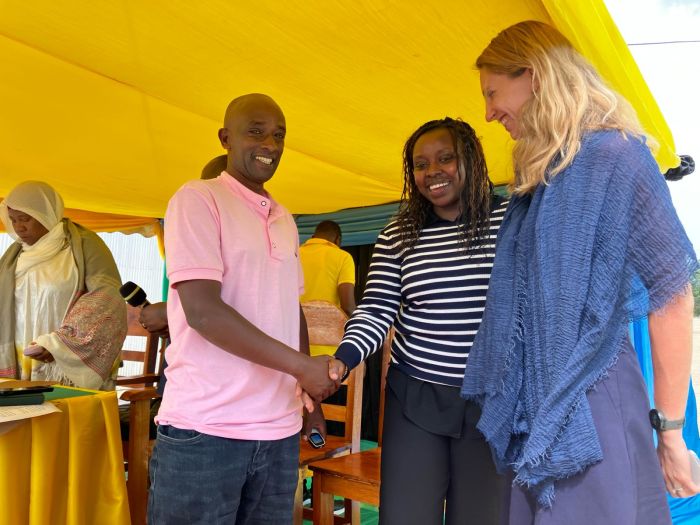In Kagera, an administrative region in north-west Tanzania, our local partner Kaderes is making sure farmers get paid fairly for their Acorn efforts — not just when it comes to how much, but also when it comes to how.
Why fair pay isn’t always easy
One of our commitments at Acorn is that the smallholder farmers receive 80% of the revenue from the sale of their Carbon Removal Units (CRUs). We collaborate with local partners who are in charge of getting that money to the farmers — but that’s not always as easy as it sounds.
First of all, keeping track of who needs to get paid how much takes a lot of organization and effort. On top of that, many of these farmers live in areas where the nearest bank branch might be in a city or town a long journey away, making it a hassle to withdraw money paid into a bank account. Cash payments come with their own challenges.
Mobile payment: a modern solution
Kaderes, our local partner in Tanzania, found a solution for this conundrum. In the Kagera region, they have embarked on a partnership with Tigo Pesa, a mobile money service that enables users to make payments and transactions using their mobile phone.
This allows Kaderes to pay farmers more securely, more directly, and in a way that is easier to monitor and builds trust. It’s better for farmers, too — all they need is a mobile phone and an ID number. And with many kiosks in rural areas, it’s easy for them to withdraw cash if they need it. It’s a system that’s practical and accessible for young and old alike.

Financial freedom festivities
The official launch of this partnership with Tigo Pesa was cause for celebration — graced by Regional Commissioner of Kagera Hon. Fatuma Mwassa, together with other government officials including district commissioners and district agricultural, environmental and cooperatives officers. Acorn was represented by Emily Ongus, Merel van Sommeren, farmer beneficiaries and their representatives.
Government officials were happy to endorse this initiative, and to see how farmers are benefiting from this money, how they’re putting it to good use — and how the government can support them. For those farmers who did not yet have an ID number, the commissioner offered them an opportunity to apply for one with an expedited process, so they too could later receive mobile payments instead of cash. Farmers were still and will still be paid in cash until they receive their IDs.
The value of local partners
This is just another example of how our local partners are invaluable to Acorn and how partnerships with various stakeholders are important. Kaderes identified an issue, took the initiative to address it, and as a result, everyone benefits — but smallholder farmers most of all. The way it should be.

About Acorn
We help support smallholder farmers in developing countries transition to agroforestry. Together with local partners, we facilitate the funding and training needed by farmers to start their agroforestry transition. Transforming the sequestered CO2 through agroforestry into Carbon Removal Units (CRUs), we offer carbon credits to responsible corporates to help them reach their climate goals. The growth of the trees is measured with satellite imagery, AI and LiDAR, and certified by ICROA-accredited Plan Vivo.
With 80% of the sales revenue going directly to the farmers, it creates an additional income stream and helps them adopt a more climate-resilient way of farming that improves food security, biodiversity, and financial independence.
Get involved with Acorn
The Kaderes project in Tanzania
This Plan Vivo-certified project supports smallholder coffee farmers in the Karagwe and Kyerwa districts to overcome low productivity and crop loss from climate change by transitioning from cultivated land to agroforestry. Farmers are rewarded for the sustainable changes in their farming practices with increased crop yield, food security, and income diversification. In addition to these livelihood benefits, the environment also thrives under such an agroforestry system, resulting in healthier soils and enhanced biodiversity.
View project

Subscribe to our newsletter
Stay updated on our Acorn activities and the latest carbon news
